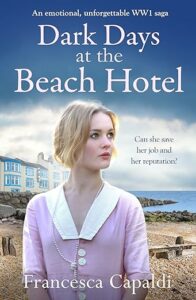Dark Days At The Beach Hotel By Francesca Capaldi
22 November 2023
 We are delighted that you could join us to talk about your upcoming release. Could you tell us a little more about it? Dark Days at the Beach Hotel is the third in the Beach Hotel series but is also a standalone. It starts in October 1916, during World War 1, in a luxury hotel in Littlehampton in Sussex. Most of the men who’d worked there are now at war, including the odious manager, the husband of Helen Bygrove, who has taken over the management of the hotel. Despite her greater skill in managing the place, resentment from some quarters means that Helen finds herself up against what seem like insurmountable obstacles, which include police investigations. During the latter, she encounters the good looking but rather aloof Detective Inspector Toshack.
We are delighted that you could join us to talk about your upcoming release. Could you tell us a little more about it? Dark Days at the Beach Hotel is the third in the Beach Hotel series but is also a standalone. It starts in October 1916, during World War 1, in a luxury hotel in Littlehampton in Sussex. Most of the men who’d worked there are now at war, including the odious manager, the husband of Helen Bygrove, who has taken over the management of the hotel. Despite her greater skill in managing the place, resentment from some quarters means that Helen finds herself up against what seem like insurmountable obstacles, which include police investigations. During the latter, she encounters the good looking but rather aloof Detective Inspector Toshack.
What was the inspiration behind your book? What prompted you to tell this story? The series itself was inspired by a hotel with the same name that used to actually exist in Littlehampton in my younger days. I was asked by an agent a few years ago to come up with an idea for a saga. I’d written quite a few novels set by the sea, but never one actually set in Littlehampton, which is where I was brought up. For some reason, the Beach Hotel came to mind as a setting, and I pitched what became the first in the series, A New Start at the Beach Hotel. The agent didn’t take me on, but I wrote the book anyway, which was later taken on by Hera Books. The Beach Hotel was a magnificent Victorian edifice that stood on the large common between the beach and the promenade road. It was sadly demolished in the early 1990s.
Having recounted the loves and lives of its employees, Edie and Lili, in the first two books, I felt that Helen Bygrove herself, whose manager husband throughout the first two books had been a belligerent presence, had her own story to tell.
Without giving too much away, what was the hardest part of the book to write? The elements involving the police and the court room scene were the hardest parts. I had a look at cases reported in local newspapers of the time, which helped, and also at a real libel case that took place in Littlehampton in the early 1920s. Trying to fit together all the pieces and bring them together in a believable way by the end was quite a challenge!
What kind of research did you do before beginning the book? There are always lots of different elements to look at for a historical novel. I own numerous books on the era around and during World War 1, many of which I’ve read from cover to cover. A lot of things changed rapidly during the war, such as food rationing and conscription, so it’s vital to keep up with what was happening on the wider scene. Some of the research I’d already done for the first two books, like what décor the hotel might have had in that era and what Littlehampton looked like. There are so many photographs of the town at the time, especially the beach area, that it was quite easy to picture myself in it. For the year-to-year fashions I have a wonderful book showing a decade’s worth of images from the Sears Catalogue.
I do think, being a history graduate, that I enjoy research a little too much and could do it all day. Most of the time only a certain percentage of what I’ve learnt is needed, but I feel I won’t know what I need until I’ve read it, if you see what I mean!
When did you realise you wanted to be an author? I’ve wanted to be an author since I was a child. ‘Writing’ is something I’ve done all my life. I’ve put it in inverted commas because for much of my life it wasn’t actually written down. The stories would take place in my head as a child. I used to build worlds and create characters when I was bored, or roller skating, or swinging on my swing in the back garden. My story creation went on pretty much like this until I joined a creative writing class in my forties.
What book do you wish you had written? The Herb of Grace by Elizabeth Goudge. I read this book many years ago, along with the other two in the Eliot Chronicles, long before I’d heard of the RNA and her involvement in it. I’ve read it several times, and it has remained one of my favourite books.
Can you tell us what you are working on now? I’ve just signed a contract for three more Beach Hotel books, set between July 1917 and Christmas 1919, so I’m working on the fourth in the series, currently called Secrets at the Beach Hotel. It involves two secret inter-class relationships between hotel staff and guests, which become intertwined and problematic.
About the Author
 Francesca has enjoyed creating stories since she was a child, encouraged by a Welsh mother who was good at improvised story telling. Writing both under her maiden name, Francesca Capaldi, and her married name, Francesca Burgess, she is the author of short stories published in the UK and abroad, and several pocket novels. She is a member of the Romantic Novelists’ Association and the Society of Women Writers and Journalists. The first novel in the Wartime in the Valleys series, Heartbreak in the Valleys, was shortlisted for the Romantic Novelists’ Association Historical Award 2021. Both the Valleys series and her new Beach Hotel series are published by Hera Books. Francesca was born and brought up on the Sussex coast, but currently lives in Kent with her family and a cat called Lando Calrission.
Francesca has enjoyed creating stories since she was a child, encouraged by a Welsh mother who was good at improvised story telling. Writing both under her maiden name, Francesca Capaldi, and her married name, Francesca Burgess, she is the author of short stories published in the UK and abroad, and several pocket novels. She is a member of the Romantic Novelists’ Association and the Society of Women Writers and Journalists. The first novel in the Wartime in the Valleys series, Heartbreak in the Valleys, was shortlisted for the Romantic Novelists’ Association Historical Award 2021. Both the Valleys series and her new Beach Hotel series are published by Hera Books. Francesca was born and brought up on the Sussex coast, but currently lives in Kent with her family and a cat called Lando Calrission.
Amazon: 
Website and blog: https://www.francesca-capaldi.co.uk/
Facebook: www.facebook.com/FrancescaCapaldiAuthor/
Twitter: https://twitter.com/FCapaldiBurgess
Instagram: https://www.instagram.com/francesca.capaldi.burgess/
TikTok: https://www.tiktok.com/@francesca.capaldi.author


